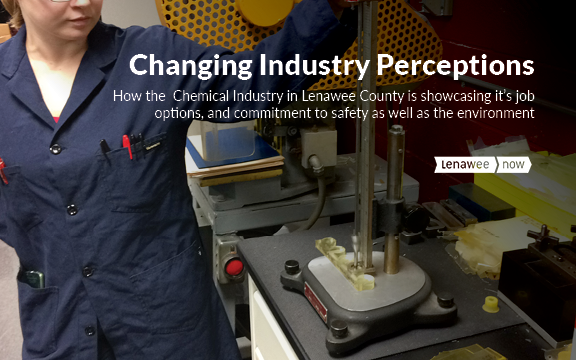The Challenge
The chemical manufacturers of Lenawee County in Michigan have faced difficulty filling entry-level positions to meet growing demand. So much so that one president and CEO stated that his company turned down more than $10 million in contracts due to the shortage of production workers.
This challenge is compounded when considering the role that these manufacturers will increasingly play due to the growth of the electric vehicle (EV) market. EV manufacturers are projected to spend more than $515 billion on production by 2030. As a result, the chemical manufacturers in Lenawee are in a prime position to capitalize on the expanding market for the special additives, coatings, and adhesives—all of which are necessary for continuous improvement of the Lithium-Ion battery—and composite materials and plastics that make up lightweight EVs. This new opportunity only increases the need for high-quality workers to fill production positions and demonstrates the criticality of the chemical industry in Lenawee County.
The Solution
To address these issues head-on, Lenawee Now, the county-wide economic development agency for Lenawee County, in partnership with the Lenawee Intermediate School District (LISD) and Michigan Works Southeast, formed a collaborative of chemical manufacturers. Funded in part by a Michigan Industry Cluster Approach grant from Michigan’s Department of Labor and Economic Opportunity, the collaborative uses the U.S. Chamber of Commerce Foundation’s Talent Pipeline Management® (TPM) approach to organize and manage their talent pipeline. At the helm of this collaborative is Jack Townsley, a recent retiree from LISD utilizing his years of expertise to contract for Lewanee Now, and a graduate of the TPM Academy®.
Through facilitated discussions, Townsley worked with the collaborative to identify and understand a collective “pain point” of filling entry-level production roles. Once the issue was identified, the collaborative needed to determine the cause of the issue and forge a path towards a solution. The employers expressed confidence that these were great jobs that came with competitive wages and benefits packages. However, there was a widely held belief in the community that jobs in the chemical industry were, by their very nature, dangerous and not environmentally friendly.
To combat prospective job applicants’ misperceptions, the collaboration started with rebranding and marketing strategies. Based on TPM’s suggested approach, employers viewed their recruiting and hiring process as a supply chain. They targeted initial efforts at future potential applicants attending high school and their parents, who would play a key role in guiding the students’ post-graduation career choices. The collaborative decided to create a series of videos to promote the chemical industry in Lenawee County and their promising career opportunities.
Thanks to partnerships with local science teachers, marketing firms, and videographers, the first video,
The videos have been vital in raising awareness among high schoolers about the opportunities afforded by the chemical manufacturing companies, and the possibility of building a career close to home.
Success So Far
The chemical manufacturing companies are making necessary strides to be more involved with their local talent pipeline. For example, company representatives now work directly with local chemistry teachers on developing chemistry-based lesson plans featuring activities and materials provided by the companies. In addition, the collaborative is now part of a guest lecture program that offers classroom speakers to all K–12 school districts in the county.
More projects and collaborations have emerged thanks to events like Elements of Collaboration promoting the TPM® methodology, endorsing the opportunities and economic impact of the collaborative, and informing local and state leaders of the work going on in Lenawee County. The adoption of a nationwide competition for middle schoolers centered around chemistry, “You Be the Chemist,” has generated more interest at an early age in the possibility of working for one of the collaborative’s companies. There were close to 50 students across 3 middle schools that participated in the first competition, at which the chemical manufacturing companies volunteered.
(On bubble below paragraph) “I don’t need kids to love chemistry in middle school, I’ll settle for just being curious,” says Mark Kramer, president and CEO of Anderson Development Company.
Solving Industry Problems Through Partnership
These local talent pipeline efforts have resulted in numerous partnerships with organizations like Michigan Works Southeast, Michigan Rehabilitation Services, and Goodwill Industries. Broader collaboration has become invaluable to the employer collaborative. For example, Michigan Works Southeast helped to host a virtual job fair featuring the original employer collaborative members and reviewed and vetted potential training sources for entry-level chemical operators and industrial maintenance technicians.
Staying Ahead
Before the introduction of the chemical manufacturing collaborative, Townsley was routinely hearing from collaborative members that their collective production operator openings were 50 to 100 workers short. In the last meeting, most companies had only one or two openings. “Whether those numbers are completely due to our TPM employer collaborative efforts, I cannot say.
Lenawee Now has now expanded their TPM efforts to support additional industry sectors. This includes automotive dealerships and their work to build a pipeline for entry-level technicians and upskill and transition existing technicians to EV. By working in collaboration with LISD’s TECH Center, the employers helped create a refresher course focused on the skills needed to pass the State of Michigan’s Brakes certification. Eleven workers from four dealerships have passed state certification exams and have begun continued education programs. TPM strategies are also being implemented with Lenawee County Wineries to establish a Department of Labor Registered Wine Makers Apprenticeship, providing customer service and wine knowledge training for tasting room staff.

